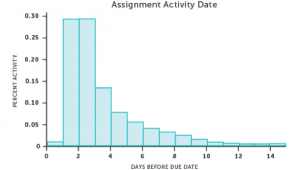Every high schooler, college student and even sometimes your parents fall trap to the wonderful life of procrastination. Most see it as they have more important things to do at that given time, then when the assignment is due they see themselves stuck in a ditch with no way of getting out. I see my friends and I currently falling into this trap even knowing the resulting consequence. Talking to college students, many of them try to convince you that they work better when they get closer to a deadline, but with new studies being released, that might not be accurate. So the overwhelming question remains does procrastination ultimately lead to lower grades?
Warwick School of Business in England conducted a survey where they received results saying that every hour you procrastinate, your grade drops. In addition, students who happen to wait until the final moments of the assignment tend to do a couple percentage points worse than if they started earlier. Reading this result made me remember something that we mentioned in class one time. Andrew mentioned every time you check your phone in class, your grade is going to drop one letter. Both of these are connected because in both situations the student is getting distracted in some way. According to the Warwick School of Business in October 2015, they investigated roughly 500 first year students and 275 third year students as they came to the end of their term assignments. As you would assume since we are dealing with college students, the majority of them turned in the assignment within the last day that it was available. Studies concluded that close to 90 percent waited towards the end of the deadline- and that caused their grade to drop 5 percent (Study Here). While also looking at this study, we wanted to see if there was variance to the students who submitted assignment well before the last day. Where the biggest variance in the scores came from the students waited until the last seconds to submit their assignments. As you would conclude by yourself, these students received almost a half letter grade lower than their classmates. So do you think students are lazy or just don’t have the skills necessary to complete task in adequate amount of time?
To prove that this wasn’t just by chance and there seems to be a relationship, we look at another study. According to Hillary Green-Lerman, this study conducted was performed on few thousand students taking a college chemistry course. For the assignments that were giving, the had at least a week to work on it. Results showed that the majority of the students waited a couple days to start the assignment, like no more than three days before it was due (Green-Lerman 2015).
The conclusion that they came to was students who worked on the assignments the day before it was due, did worse than the rest of their fellow classmates, falling below the class average by a few points. On the other hand, students who spent time working on the assignment over a long time period scored a lot higher than the average of the class, roughly three points.

I feel like I can relate to this study because obviously I have fallen victim of procrastination throughout my academic career. It wasn’t of recently where I really felt the impact of waiting until the last second to complete a final project. Junior year for my final project of AP US History, I didn’t give myself adequate amount of time to complete a rough draft. As a result, my grade showed for it, having an impact on my final overall grade. From the experience, I managed my time better when it came to submitting my final, getting a much higher grade, something I think I deserved. Ultimately, this can be used at evidence to show the difference makes when allocating more time to a certain task, as it can make a dramatic difference in your grade. After comparing the studies done by the two independent sources, we can conclude that there seems to be a correlation between the amount of time that you procrastinate and the grade received on the assignment. Both studies show drops in grades when deciding to wait until the last minute to work on the assignment. So this could add another question, whether there is a way to motivate students into working on assignments over a long period of time, maybe go about the approach that Andrew does and offer extra credit if you affectively manage your time.
Sources:


I found this very interesting. Personally, I am a planner that likes to get things organized well before the deadline and work on a little each day. I see procrastination like this: http://www.ted.com/talks/tim_urban_inside_the_mind_of_a_master_procrastinator?language=en#t-737395 . However, my best friend from high school was the opposite, and we always fought about whether procrastination was truly a negative. He used this TED Talk (http://www.ted.com/talks/adam_grant_the_surprising_habits_of_original_thinkers?language=en) to argue his side, although it only focuses on creativity and disregards other qualities that determine a grade like your blog discusses. In the talk, Adam Grant refers to “originals” as the sweet spot between extreme procrastination and extreme planning. He says that the moderate procrastinators are 16% more creative than non-procrastinators. Grant then goes to share a series of historical examples and research endeavors to support the theory of creative originals. Definitely watch this, it somewhat plays a devils advocate to your blog and most people’s thoughts about procrastination.